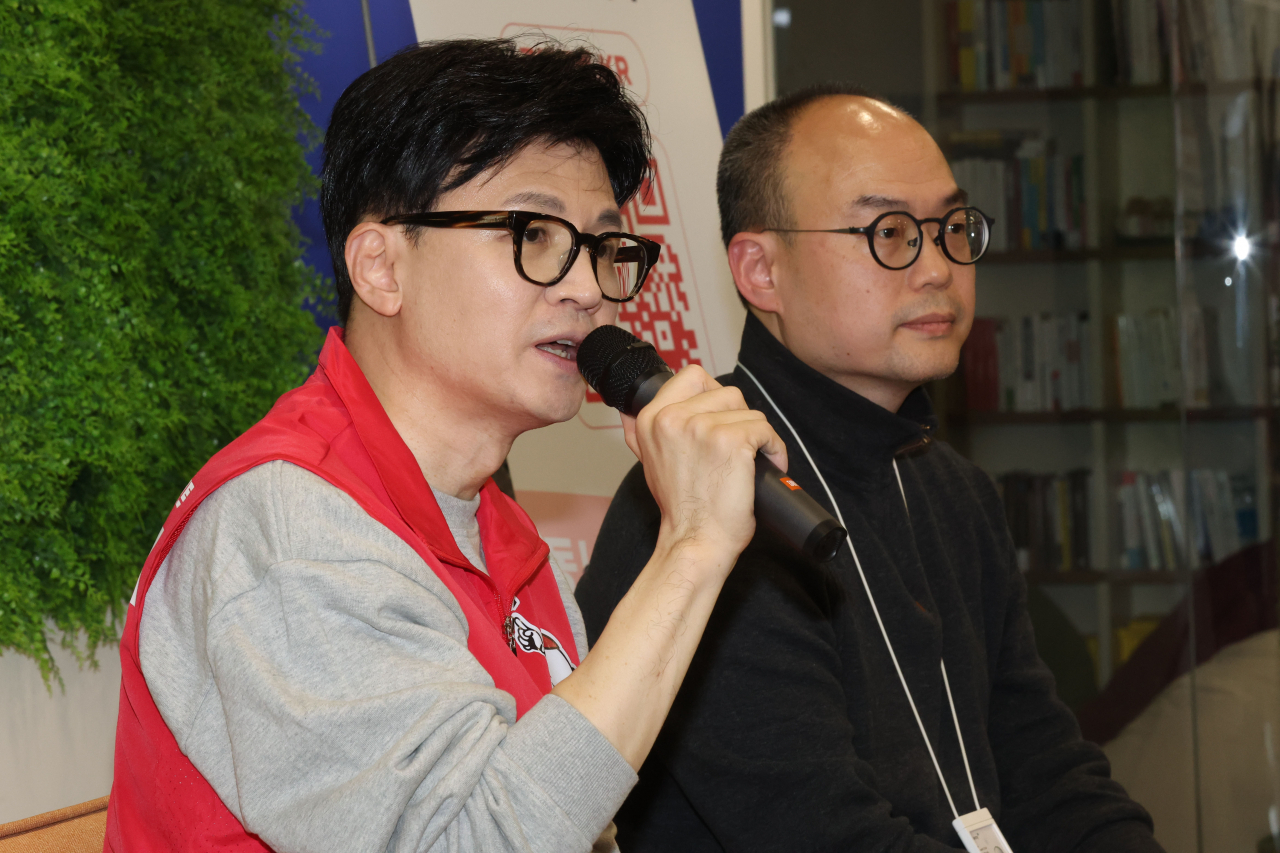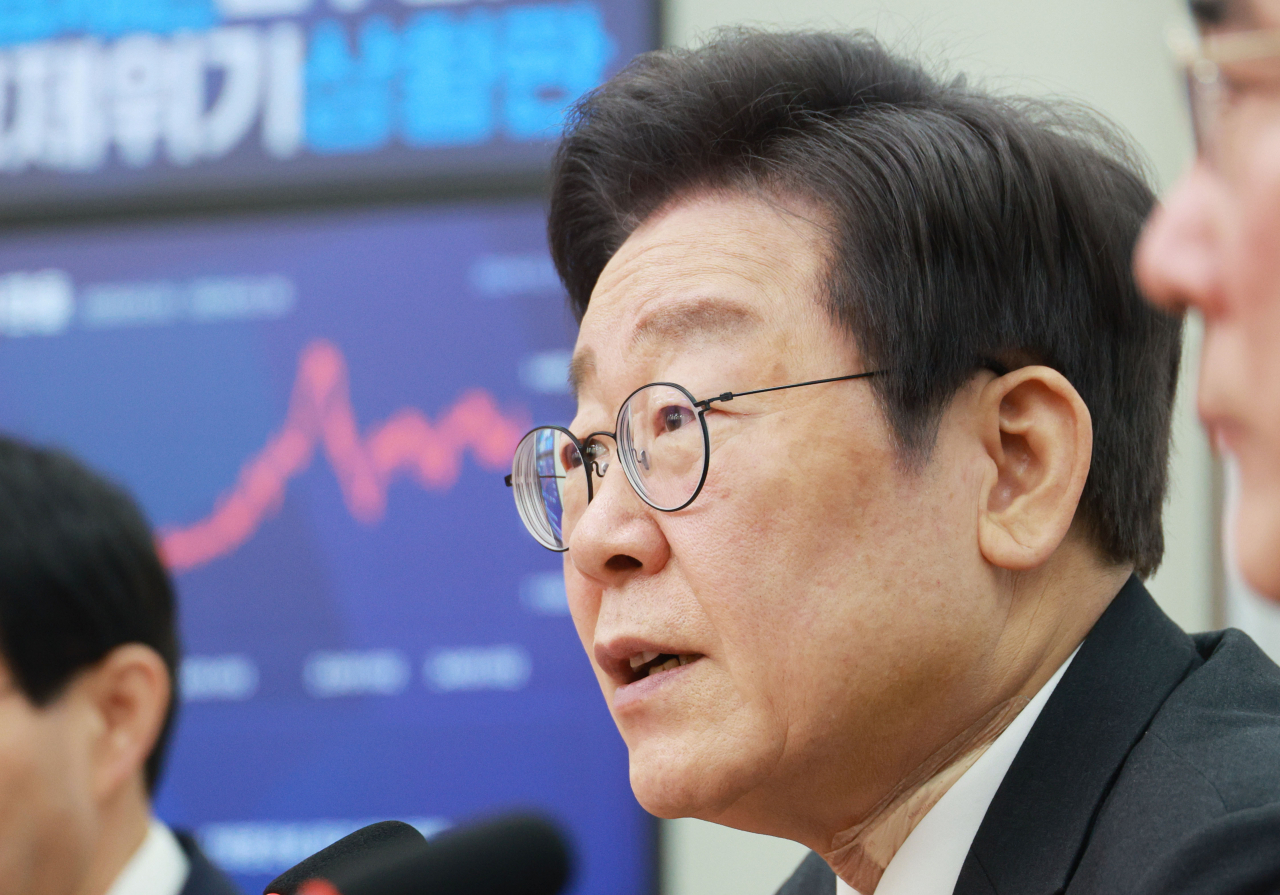 |
People Power Party Interim Chairman Han Dong-hoon speaks about the People Power Party's new election pledge to resolve the country's falling birth rate in southern Seoul on Thursday. (Yonhap) |
The two main parties on Thursday each announced a set of pledges designed to reverse the country’s falling birth rate as the April 10 legislative election approaches.
The ruling People Power Party vowed to establish a government agency dedicated to population planning and birth rate boosting.
“We plan to establish a separate agency to deal with the country’s declining birth rate,” its election policy committee said during a press conference held in southern Seoul.
“It’s an effort to view the birth rate issue as a national responsibility. Policies and officials handling the matter that are currently scattered across different government agencies will be able to become unified and organized under one department,” it added.
If launched, the agency will operate under a deputy prime minister-level leader, the committee explained.
Another key pledge was to make it easier for both male and female employees to take parental leave. A bill will be drawn up to require employers to give not only mothers, but fathers one month's leave after their children are born, to help their partners give birth and raise children.
During that one-month period, and for the year of child care leave they are also entitled to, the limit on the salary to be paid by companies, would be raised to 2.1 million won ($1,560) from the current 1.5 million won.
The election policy committee had said earlier that Thursday’s pledges would be a part of its bigger road map to resolve the country’s changes in demographics, social polarization and climate crisis.
The committee hinted that the ruling party’s resolutions would include improving the country’s parental and pregnancy leave system, providing more child care for infants, and resolving workforce issues at small and medium-sized enterprises.
“Countermeasures against the low birth rate are closely tied to resolving the widening social gap in the society,” the committee said in a statement.
“The government and the ruling party must actively come up with solutions to resolve such gaps, as start-ups and SMEs fail to offer parental and pregnancy leave as often as big enterprises (due to their relatively small labor pool),” it added.
Thursday’s announcement marks the ruling party’s first official pledge for the April election, under the helm of its Interim Chairman Han Dong-hoon.
Ahead of the ruling party’s announcement, the main opposition Democratic Party of Korea rolled out a plan focused on improving the public housing system and loosening loan regulations for parents.
If the plan materializes, parents with two or more children will be eligible for a public housing program that will provide them with 79-square-meter or 109-square-meter apartments at cheaper-than-average rents. The parents will get priority in purchasing the apartments after paying rent for a certain period.
 |
Democratic Party of Korea Chairman Lee Jae-myung explains his party's election pledge to boost the country's birth rate at the National Assembly on Thursday. (Yonhap) |
The main opposition party also plans to expand the beneficiaries of the state-run public housing program for married couples. The current rules state that couples who have been married for less than seven years with no housing are eligible to apply for the program. The party plans to extend the number of years married to 10 years.
The launch of new cash support programs, including one that offers a 10-year, 100 million won ($74,000) loan to all married couples regardless of income or assets, was a key pillar of the announcement.
“A total of 380 trillion won ($282.8 billion) has been funneled into birth rate boosting plans since 2006, with only miniscule effects,” Democratic Party Chairman Lee Jae-myung said in a press briefing held at the National Assembly.
“Which is why we need a set of groundbreaking policies to bring about change,” he added.
Lee even suggested a rare bipartisan partnership in drawing and submitting the birth rate boosting bills, pointing to the ruling party’s decision to announce similar pledges on the same day.
“What the ruling and the opposition parties agree on must be legislated and included in this year’s extra budget, even ahead of the parliamentary election,” he explained.
Korea’s total birth and fertility rates both fell to record lows in 2022, government data showed. Only 249,000 babies were born that year, marking the first time the figure had fallen below the 250,000 mark since the government started compiling relevant data in 1970.
The fertility rate, the average number of children a woman bears in her lifetime, hit a fresh low of 0.78 in the same period.







